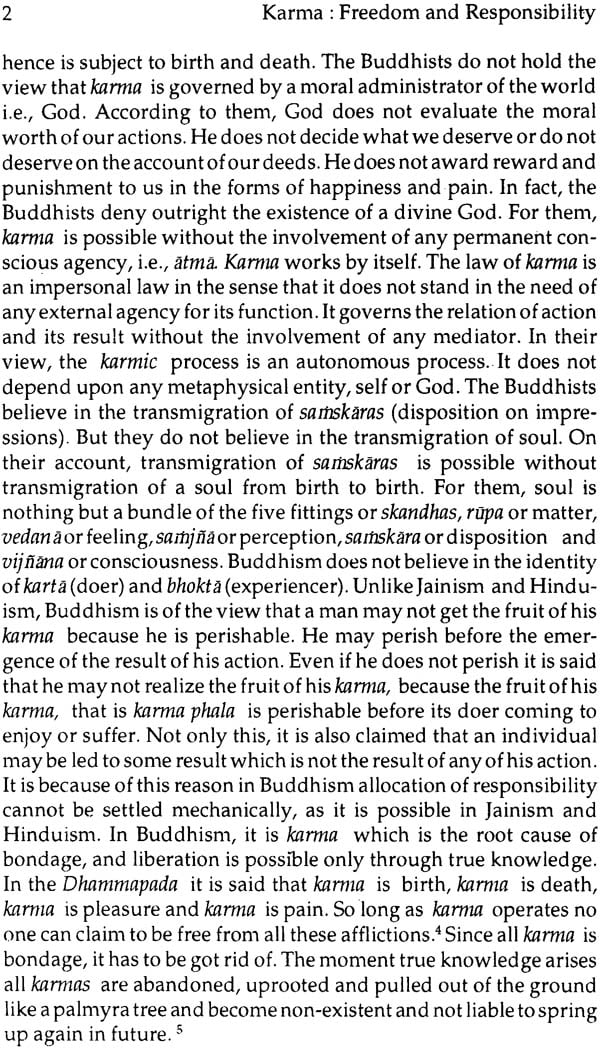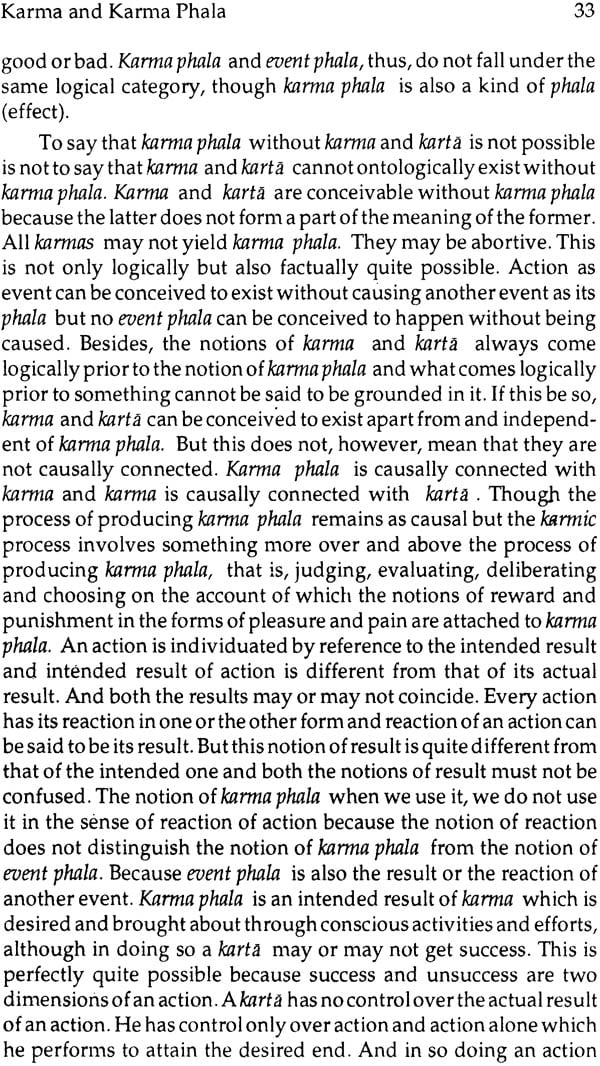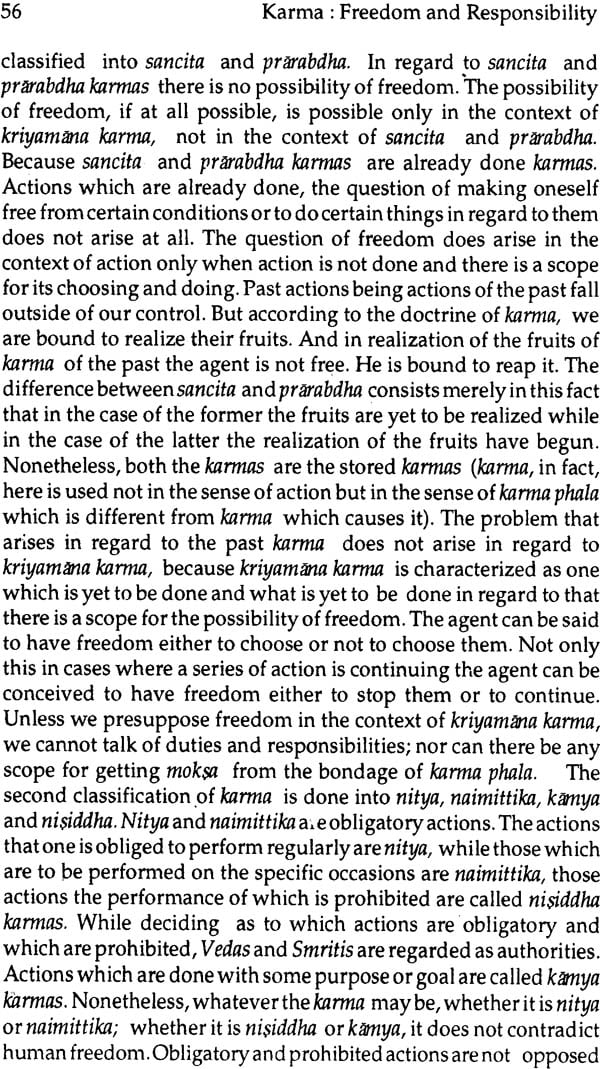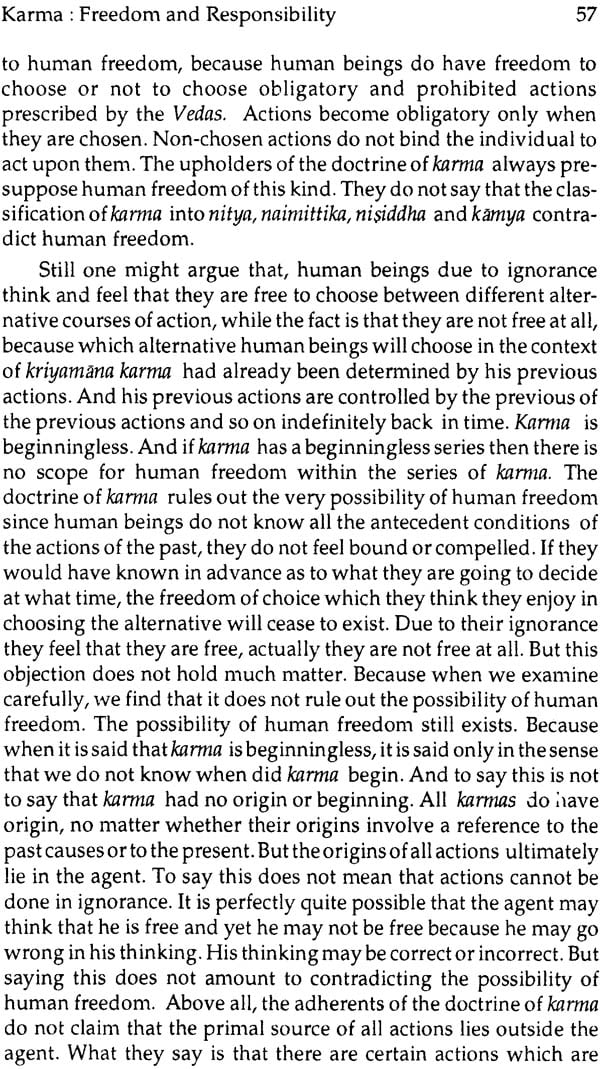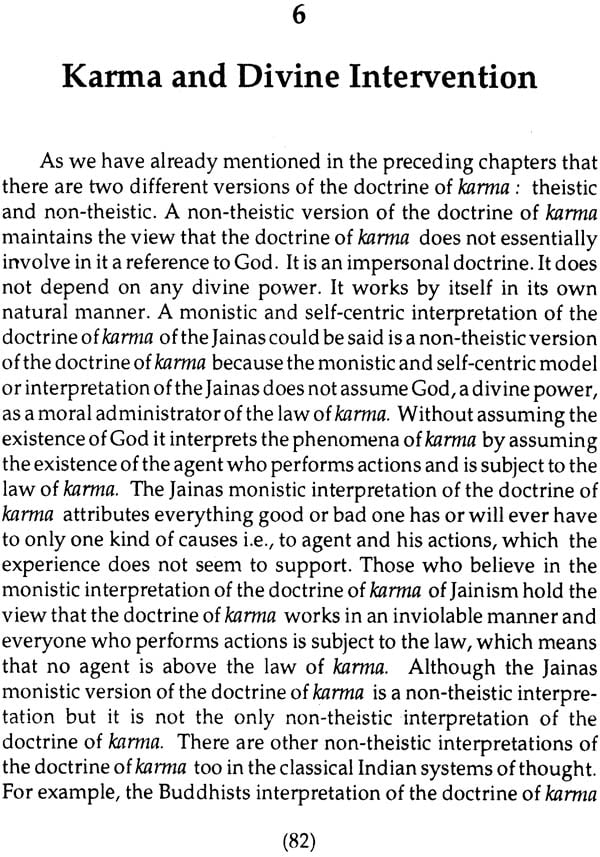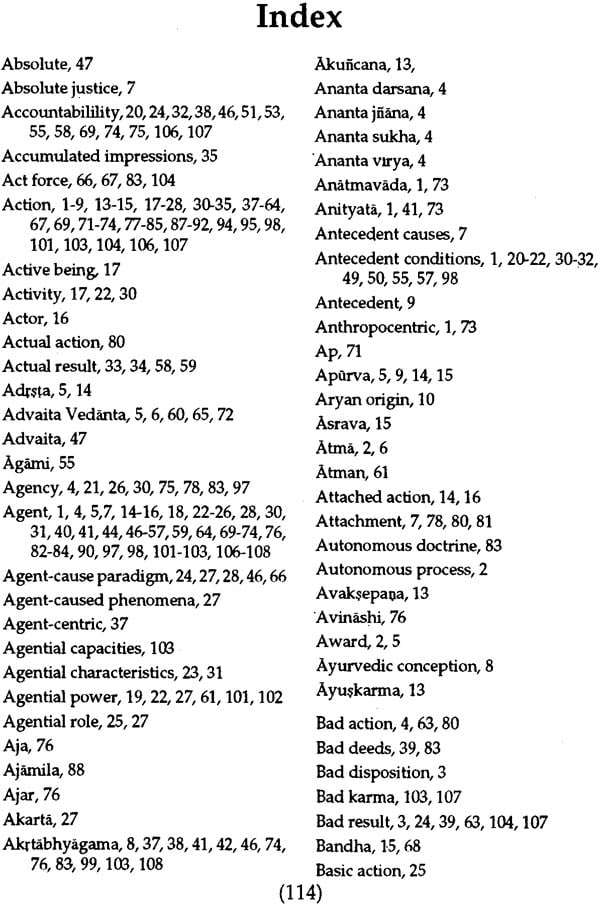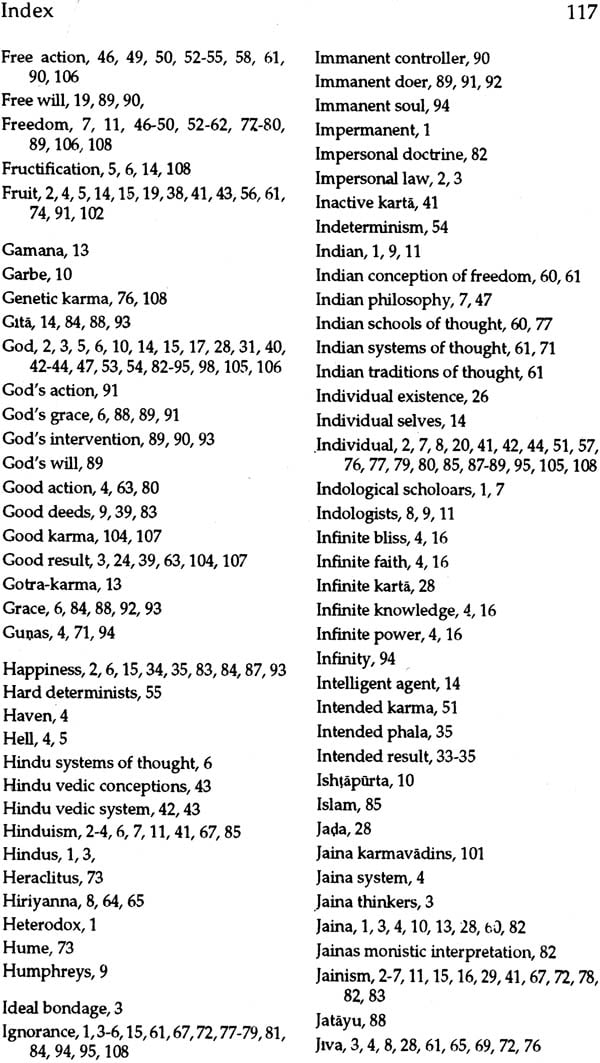
Karma Freedom and Responsibility
Book Specification
| Item Code: | IDJ575 |
| Author: | Aparna Chakraborty |
| Publisher: | Kaveri Books |
| Language: | English |
| Edition: | 1998 |
| ISBN: | 8174790187 |
| Pages: | 134 |
| Cover: | Hardcover |
| Other Details | 9.0 X 5.6 |
| Weight | 270 gm |
Book Description
Foreword
The book is the result of an intensive and critical study on the Indian concepts of Karma, Freedom and Responsibility. Law of Karma is related to freedom which is again related to responsibility, which has been beautifully highlighted by Dr. Aparna Chakraborty. It is not very easy task to cover all Philosophical systems regarding theories of Karma etc. This has been successfully accomplished be the scholar, which presupposes her Herculean labour and sincerity to the work.
In the introductory chapter, Dr. Chakraborty has given a brief but substantial account of the law of Karma accepted in different systems of Indian philosophy like Buddhism, Jainism etc. and their different metaphysical presuppositions in formulating these views, such as the doctrines of impermanence etc. in Buddhism, the existence of subtle matter infra-atomic in size in Jainism etc. Apart from this, the authoress has dealt at length the basic issues concerning law of Karma, e.g. Jnana Karma samuccaya uada, niskama karma, sancita karma sanciyamana karma, prarabdha karma etc. While discussing the traditional views she has also considered the views of the contemporary thinkers like Dr. Radhakrishnan, Professor Dayakrishna, Dr. Rajendra Prasad etc.
The second chapter deals with Karma and causation which gives an account of different meaning of the term 'Karma'. Many critical problems like the concept of karta, the relation between karta and karma etc. have been raised. She ultimately has come to the conclusion that karma cannot be said to the basic cause of the unity of self and body advocated by different schools of Indian philosophy. She has given sufficient reasons for not accepting the doctrine of karma as advocated by the Buddhist, Samkhya philosophers, Nyaya-Vaisesika philosophers, Prabhakaras etc. The authoress has accepted only the Vedanta and Jaina view of karta as satisfactory, which is supported by some arguments.
In the third chapter the scholar has shown a relation between karma and karma phala and also pointed out some philosophical problems arising out of some factors like difference between karma and event, relation between intention and action, relation between the notions of kartrtva and bhokrtva etc. No karma phala theory is to be taken consistent according to her.
In the fourth chapter the scholar has shown the relation between karma, freedom and responsibility. To her the denial of freedom contradicts responsibility. The notion of responsibility again is connected with the notion of action. The notion of positive and negative freedom as accepted in the West and East has been highlighted. To her freedom does not entail arbitrariness. She has beautifully reflected on the views on various concepts of freedom and substantiated Indian standpoint. Dr. Chakraborty has established with the help of logic that the Indian concept of freedom is not incompatible with responsibility and the doctrine of karma at least in the context of jivanmukti.
The chapter on karma and transmigration is also very much interesting on account of the fact that it deals with the relation between karma and transmigration. The derivative meaning of the term 'samsara' is worth-pondering. A few objections have been raised by the scholar and their probable solutions have been suggested.
The chapter six also considers a very important related issue divine intervention which is connected with law of karma. It represents a total picture of all the systems of Indian philosophy apart from the Gita Upanisad etc. relating to divine intervention. She has considered at length the critical questions as follows: If God is the controller of everything, He is also the controller of human activities and hence human activities are not under their power and control etc. In this way, it has been shown that the theistic version of the doctrine of karma suffers from a lot of philosophical difficulties.
The concluding part of the book contains the major findings like (a) the karma presupposes a karta as the relation between them is based on' causal structural meaning', (b) the thesis that karmavadins do not maintain any logical distinction between the notion of event and action, (c) the relation of karta, karma and karma phala is a causal relation, and (d) self-centric doctrine of karma is a consistent one, but the believers in this do not hold it consistently.
The work is the result of Chakraborty's original and analytic thinking. She has shown her excellence in dealing philosophical problems logically. Most of the problems treated here are novel and original in character. She has developed a few arguments in favour of her standpoint, the arguments, I think, are very cogent, interesting and convincing. She deserves congratulations for offering such a work full of logical analysis and originality.
Regarding the theories of karma and freedom there is a lot of controversies among the scholars belonging to different systems of Indian philosophy and also among the modern thinkers. The treatment of these theories as done by Dr. Chakraborty is really an 'addition' to this field, which, I believe, will be appreciated by the scholars in the field. As it does not represent what is said in the tradition, it has got some philosophic charm and flavour which may be liked by the modern scholars.
About the Book
The doctrine of karma has an old origin and is alive still today. Almost all the philosophical systems of India deal with doctrine of karma in their religious, ethical, cultural and philosophical thoughts. Therefore, it is evident that the doctrine of karma plays a pivotal role in the philosophical systems of India.
The objective of this work is to represent an intensive, critical and comprehensive study on the concepts of karma: Freedom and Responsibility with reference to the related issues like samsara, transmigration, divine intervention etc. No clear picture of the karma doctrine is available so far. This study makes an attempt to remove the vague conceptions about the karma doctrine with the help of the contemporary philosophers like Prof. Rajendra Prasad and Prof. Dayakrishna etc. Dr. Chakraborty's book could be called a continuation of the works done by Prof. Rajendra Prasad and Prof. Dayakrishna etc. on the karma doctrine.
This book of Dr. Chakraborty is an intelligent work and will create interest among the teachers, students, scholars and general readers of Philosophy.
About the Author
APARNA CHAKRABORTY (born 1967) completed her M.A., M. Phil and Ph. D. from the North-Eastern Hill University Shillong. Megahalaya
At present she is working as a lecturer of Philosophy in the in the women's college Shillong. As a scholar Dr. Chakraborty keeps interest mostly in learning and reading Indian philosophy.
| Foreword | vii | ||
| Acknowledgement | xi | ||
| Chapter 1. | Introduction | 1 | |
| Chapter 2. | Karma and Causation | 13 | |
| Chapter 3. | Karma and Karma Phala | 30 | |
| Chapter 4. | Karma: Freedom and Responsibility | 45 | |
| Chapter 5. | Karma and Transmigration | 63 | |
| Chapter 6. | Karma and Divine Intervention | 82 | |
| Chapter 7. | Conclusion | 97 | |
| Bibliography | 110 | ||
| Index | 114 |

